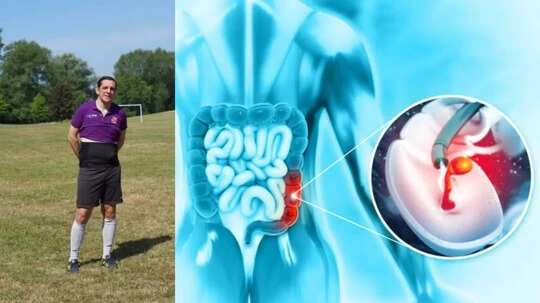A fit and healthy 39-year-old who started feeling stomach cramps, recurrent diarrhoea, and nausea thought it was just food intolerance because of eating too much bread and butter.
But for Rob McPherson from Manchester, it was not the end of it, as his agony was just increasing every single day. “I was just a normal guy playing football every week, going to work as usual, and then I started feeling a little bit ill around October time,” the digital media worker said. At first, Rob thought it could be his favourite bread, but later, as the symptoms increased, he even stopped drinking beer. “The stomach cramps turned into bloating as well,” he explained. Slowly, Rob stopped eating a lot of his favourite foods, thinking they could be triggering and contributing to stomach issues, which had become worse. Rob had to take time off work to recuperate, as we began struggling to sleep and constantly felt bloated. This is when he went to the doctor, who, after a thorough investigation and scans, revealed a 7cm tumour near his stomach that needed urgent surgery. Rob was immediately operated on, after which doctors told him he needed to get a biopsy and stoma done. A few days later, he was diagnosed with bowel cancer. Following his surgery, Rob began a cycle of chemotherapy along with radiotherapy to shrink the remaining tumour, after which it was completely removed. He has been cured completely and declared cancer-free.
What is bowel cancer?
Also known as colorectal cancer, bowel cancer usually starts in your colon-the large intestine that helps carry digested food to your rectum and out of your body. It develops from certain polyps or growths in the inner lining of your colon. Doctors have screening tests that detect precancerous polyps before they can become cancerous tumours. Bowel cancer that is not detected or treated can spread to other areas of your body as well. According to experts, bowel cancer is a common cancer, and it is estimated that one in 20 people will be diagnosed by the time they are 85 years of age. About 90 per cent of bowel cancers are adenocarcinomas, which start in the glandular tissues lining the bowel. Other less common types of cancer can also affect the bowel, including lymphomas and neuroendocrine tumours. Cancer can also start in the small bowel, but it is rare.
What causes bowel cancer?
A few factors that increase your risk of bowel cancer include:
- A diet that is low in fibre
- High consumption of red meat, especially processed meats
- Being overweight or obese
- Alcohol consumption
- Smoking tobacco
- Inherited genetic risk and family history
- Inflammatory bowel disease, such as Crohn’s disease
- Polyps
- Having a previous diagnosis of bowel cancer
Signs and symptoms of bowel cancer
A few early signs of bowel cancer include:
- Change in bowel habit, including diarrhoea, constipation, or the feeling of incomplete emptying
- A change in the appearance or consistency of bowel movements, such as thin bowel stools
- Blood in the stools
- Abdominal pain, bloating, or cramping
- Anal or rectal pain
- A lump in the anus or rectum
- Unexplained weight loss
- Chronic fatigue and tiredness
- Blood in the urine or passing urine frequently or during the night, change in urine colour – dark, rusty, or brown
